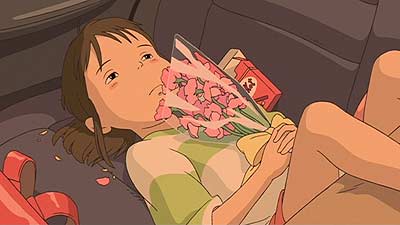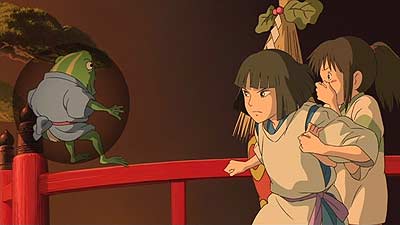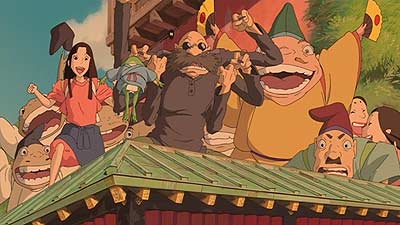Spirited Away
More animated genius from Miyazaki as The Mouse tries to muscle in.

It perplexes me to this day that this year's Oscar buzz surrounding Spirited Away is due to the fact that many saw it as the underdog in the Best Animated Feature category. I beg your pardon? Consider the contenders; Ice Age (mildly diverting), Lilo and Stitch (admittedly the best in-house film I've seen from Disney in years, which isn't necessarily much praise), Stallion: Spirit of the Cimarron (rubbish) and Treasure Planet (rubbish). Where, then, is the surprise that Hayao Miyazaki's latest and almost greatest should spirit away the golden baldie, admittedly under the bastardised guise of a Disney distribution? In fact I might go so far as to say Spirited Away is hands down the best animated feature released since Miyazaki's own Princess Mononoke, which surely puts it somewhere inside the best 5 animated films of all time. Albeit in my humble opinion...
The first film entirely conceived and produced since Studio Ghibli's dubious distribution handshake with the Demon Mouse's Buena Vista arm, Spirited Away highlights in no short order exactly why Disney has been taking a pounding on the Eastern front, and why it was so essential for them to forge such a deal in order to maintain any credibility. Beginning so innocently, as with almost all Miyazaki San's works, it concerns a young girl, Chihiro, as she moves to a new home in the Japanese suburbs with her parents. An accidental wrong turn by her father sees the family unit's journey cut short by a mysterious voodoo bollard sitting outside a long, dark tunnel. Far from impressed, it takes some coaxing from her bizarrely adventurous parents to get Chihiro to tag along as they investigate the strange opening.
Drawn along by a mysterious wind, they emerge at the entrance to what Chihiro's father reasons must be an abandoned theme park. Investigating further they cross a dry river bed and enter a small, abandoned town. Drawn by the smell of freshly cooked food, Chihiro and her parents discover street upon street of market stalls and eateries, from one of which the smell is emanating. Seeing nobody around, the adults reason they can tuck in and square up with the proprietors later, which turns out to be something of a mistake. Wandering off to investigate for herself, Chihiro is disturbed by the emergence of strange, ghostlike figures and runs screaming for her parents' assistance, only to discover they have turned into snorting, snuffling pigs. Wah!

With darkness falling and the way back now rendered impassable by a massive river, Chihiro is trapped in a new, frightening and bizarre world of shuffling monsters and talking frogs. Fortunately help is at hand in the form of Haku, a helpful young man who tells Chihiro she must come with him and hide (that old chat-up gem, eh?) lest the towns inhabitants get a whiff of her human aroma. Secreting her at the back entrance to a massive bathhouse for spirit gods, Haku tells her to seek the help of the boiler man Kamajii in his basement workplace. Increasingly perturbed by her surreal surroundings, Chihiro nervously carries out her instruction from Haku in badgering Kamajii for a job. Eventually the six-armed soft-touch gives in and places her in the care of Lin, a young fellow human (or so we assume; nothing much is as it appears in this world) who takes her to see the owner of the bathhouse, the evil witch Yubaba.
Desperate to save her parents from becoming bacon for the bathhouse's guests, Chihiro signs a contract for Yubaba, earning herself a job but surrendering her name to the witch, a technique the old hag uses for erasing worker's memories in order to control them. Now known only as Sen, our young protagonist sets about her newfound grind, alienated from her fellow workers by the race divide in a society where humans are most definitely frowned upon. All the time looking for a way to rescue her parents and escape, Sen seeks the help of young Haku, who himself has had his name stolen by Yubaba and can remember nothing of his past.
There are many similarities with previous Miyazaki features here, more of which later, but Spirited Away marks something of a departure in that it's an altogether darker vision than we've previously seen; more Grimm than Goofy you might say. There are many themes, the majority of which would seem to concern racism and social segregation which in themselves are sufficiently gloomy. Thrown into the mix though are the issues of children trusting strangers (Chihiro refusing gold rather than sweets from one sinister spirit), learning never to take people at face value and the downright depressing proposition of child labour; something that surely concerns many in various areas of the globe, perhaps most notably the far East.

It's the lack of condescending tone in dealing with issues like this that highlights the woeful inadequacy of current mainstream Western animation. Whilst Disney have only recently gotten over approaching broad issues like "growing up" with a patronising simplicity and tendency to signpost, Studio Ghibli have been crediting their young audiences with the kind of maturity and respect that suggests exactly why your average Japanese youngster isn't running about town in a stolen car squeezing off rounds from a Mac 10 whilst swearing like a trooper. Innocent, no. Crafted with understanding of a child's keen intelligence and imagination? You'd better believe it.
Which is not to say of course that Spirited Away is something that will be wasted on an adult audience. Quite the contrary, there are many facets that will probably go unappreciated by your average ten-year-old, proving once again how capable Ghibli are in constructing something that's enjoyable to all ages. Whilst the rest of the world is heralding the revolution of CG animation, here Miyazaki and his team use it sparingly, almost transparently, to enhance the odd bit of scenery. Happy to constantly refine traditional techniques instead, the result is some of the most detailed and imaginative world-building you're ever likely to see, every scene breathing more life and background nuance than most other features manage in an hour and a half. Easily the most beautifully realised living, breathing landscape I've witnessed in an animated feature, Spirited Away's spirit world is a thing that entrances as much as it provides ghoulish chills, ensuring your kids are more likely to be captivated than scared behind the couch.
The tone is alleviated in the latter half of the film as Sen comes to discover her first notion of love in her friendship with Haku, and several of the more imposing entities are revealed as altogether more agreeable creatures than we first expected. Unlike your average Disney romp, however, there's no sugar-coated topping and sudden revelation that "all you need is love", rather one leaves with a sense that pain is a necessary part of learning and sometimes not everything in life can be made better with a wish and a prayer. Hard graft, Miyazaki seems to be saying, is the essence of success. I'm inclined to agree, since he himself should know.

As inclined as I am to rave on all day about Miyazaki's god-like status, it would be churlish of me not to point out at least the largest of the numerous flaws witnessed herein. A masterpiece this may be, but for once in a Ghibli film there's a sense that maybe a little too much is going on, with the subsequent feeling that the movie for once feels longer than it really is. Despite sporting a running time similar to Laputa: Castle in the Sky, Spirited Away crams in probably more than twice as much in terms of thematic content and sheer detail; quite a feat when you consider just how beautifully realised that film was. As a result there's occasionally a bit of brain-lock, though fortunately Miyazaki still finds time for the quiet moments (check out the contemplative train journey near the end of the movie), affording the viewer some opportunity to catch up with their eyes.
All that said, mind you, at no point does the movie feel anything less than unbelievably enjoyable, this reviewer more cursing his own inability to comprehend everything at once than blaming old Hayao for cramming it in there in the first place. It's like being given a huge bag of your favourite sweeties after dinner and lamenting your physical inability to eat them all at once. If you consider this is the biggest criticism I can find to level then all in all one has to admit this movie is something of a gift. Thankfully never selling out to the Disney ideal of Western appeal, Spirited Away simply delivers more and better of the same beautiful genius of which we are growing increasingly accustomed to from our neighbours in the East. There are certainly those who will still remain unable to "get" the more intellectual oriental vibe, but it would be a foolish individual who denied themselves the pleasure of trying.
Is this the best Ghibli film yet? Mmmmmm, no. On technical merit I'd still place Princess Mononoke first for it's arguably a purveyor of superior pacing and overall 'roundedness'. On a personal level I still prefer the Jules Verne-inspired sheer escapism of Laputa: Castle in the Sky. That this easily occupies third place is no condemnation mind you, since the pedigree of the field is undeniably one of the most astonishingly accomplished in any category of film. For all the technical merits, mind you, Spirited Away, like it's counterparts, is ultimately all about the imagination, and on that level cannot possibly be faulted. If Miyazaki's next film is anywhere near as good as this my head will probably explode. The man's just too damn good to us all.
From my established base on Isla Apathetica, I award this movie 5 out of 5 Disko Units.
Miyu Irino (Haku)
Mari Natsuki (Yubaba)
Bunta Sugawara (Kamajii)
Word to the Mouse: If Disney have done one thing right it's treating the English dub with the respect it deserves. Whilst the original Japanese is undoubtedly preferable (and hence rightly credited above), just as with Mononoke and Laputa before it Disney have done a splendid job of the translation and voice casting, putting this on a par with most other big-budget animations of Western origin. I also applaud their decision to both refrain from slapping their own logo all over the press and also to release the film in it's original foreign dub in selected cinemas. The spirit of Walt, it would seem, is nothing if not gracious in defeat.